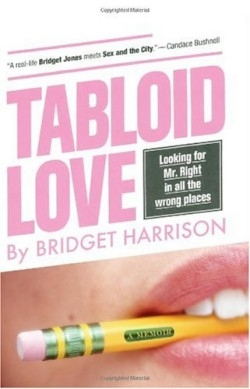Tabloid Love
Looking for Mr Right in All the Wrong Places---A Memoir
Being a dating columnist for the New York Post is tricky, discovers the author of this memoir. Bad dates make for more interesting copy, and a great date may turn into a boyfriend and spoil the whole gig completely. Tabloid Love has the breezy, gossipy tone of “Chick Lit,” but Harrison is never catty as she struggles with balancing her personal life and her career. Her work is a passion, not a backdrop to her quest for a man; this emphasis adds substance to what might otherwise be dismissed as a frivolous book.
Harrison tentatively moves to New York from London just before turning thirty, to work for the New York Post. (She has also written for Marie Claire, the Daily Mail, and the London Times, among other publications.) She gives up a comfortable but passionless relationship with her British boyfriend Angus, a documentary filmmaker. Her British friends are marrying and having kids, which fills her with doubt.
She works hard at the Post and lands a permanent job and a weekly column, in which she details life in the New York dating jungle, comparing New York guys to London blokes. Ostensibly, she’s looking for love, hence the title. But there’s also an irony here, since her Post column is based on being single. Harrison recounts the best of her dating disasters, from a borderline rape in her own apartment to a romantic tryst in the Hamptons with a millionaire who turns out to be a serial heartbreaker.
She finds a long-term boyfriend in Jack, a powerful editor at the Post. Turned on by his competence, she assumes that the career-driven Jack will understand that she might have to reveal the occasional relationship detail in her column. She calls her new boyfriend “Aaron, the T.V producer” but everyone in the office knows that she’s writing about Jack. Her columns contribute to the eventual demise of the relationship, especially the piece called “No Sex in the City,” in which she complains that people who work as hard as she and “Aaron” don’t have enough sex.
The star—and the most complicated character—in Tabloid Love is not Jack or any of the men Harrison dates, but the New York Post. Harrison is a dedicated journalist, and no one can read this book without realizing both the glamour and the grind of writing for a juicy daily like the Post. The paper is owned by the right-wing News Corporation, which bothers the liberal author, especially at the start of the Iraq War. But nearly all of Harrison’s gory reporting happens within the confines of the six boroughs. She cringes every time she’s forced to interview the mother of the latest freak death accident. But she closes her heart and barges right into the homes of these poor people, forcing the questions out, and nailing the stories. She cracks only when, on Christmas Day, she is forced to interview a man whose wife died in a car accident picking up pizza. She goes through with the interview, even asking the man what he’s going to eat for dinner, but later she bursts into tears.
Harrison presents her adventures and work ethic with such élan that readers understand why she would violate her human instincts and jeopardize relationships to make it in journalism. The stress takes a toll on her body. Hardly a page of Tabloid Love goes by without mention of drinking binges or hung-over workdays. Newspaper work is so draining that after ten hours of it, all Harrison and her co-workers can do is hobble to the “Hog Pit” for an after-work drink or three. In a typical scene, Harrison is drinking martinis at the opening of the Soho House, a members-only bar and club. She runs into an ex-boyfriend, and tells him: “The drinks are free, so we’ll probably be here for a while.” Although Harrison is introspective when it comes to relationships, living in New York, and her job, she does not question the role that alcohol plays in her life. The excessive drinking may be meant as a glamorous atmospheric detail, but it is alarming in its repetition.
Tabloid Love is full of amusing and instructive dating stories, which will appeal to single women. Another audience is anyone interested in the inner workings of one of the most notorious newspapers in America. Feminists will also cheer for Harrison. When deadlines approach, boys, babies, and niceties come second to the scoop. Harrison’s book makes finding a story and a drink seem as fulfilling as finding a man.
Reviewed by
Jennifer Shahade
Disclosure: This article is not an endorsement, but a review. The publisher of this book provided free copies of the book to have their book reviewed by a professional reviewer. No fee was paid by the publisher for this review. Foreword Reviews only recommends books that we love. Foreword Magazine, Inc. is disclosing this in accordance with the Federal Trade Commission’s 16 CFR, Part 255.

